| Srl | Item |
| 1 |
ID:
110641
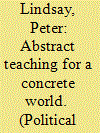

|
|
|
|
|
| Publication |
2011.
|
| Summary/Abstract |
This article argues that instructors should introduce students to abstract concepts only after they have provided concrete illustrations of them. The advantages of working from the concrete to the abstract are twofold: (1) students have an easier time conceptualizing abstractions from within a particular context, and (2) such a context provides them with a greater motivation to do so. In an effort to mirror the pedagogical approach I defend, I begin by reviewing the manner in which Plato introduces the concept of justice to his readers in Book I of the Republic. I then examine the common model of teaching abstract concepts, demonstrate how an effective alternative differs from this model, and review the education theories that support the alternative model.
|
|
|
|
|
|
|
|
|
|
|
|
|
|
|
|
| 2 |
ID:
120017
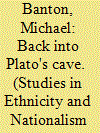

|
|
|
| 3 |
ID:
171334
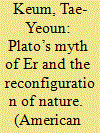

|
|
|
|
|
| Summary/Abstract |
Why did Plato conclude the Republic, arguably his most celebrated work of political theory, with the Myth of Er, an obscure story of indeterminate political-theoretical significance? This paper advances a novel reading of the Myth of Er that attends to the common plot that it shares with two earlier narrative interludes in the Republic. It suggests that Plato constructed the myth as an account of a search, akin to the sorting of potential philosopher-kings that underwrites the kallipolis’ educational curriculum, for natures that have successfully absorbed the cumulative effects of their philosophical upbringing. The model of nature presented in the myth, in turn, helps us approach the category of nature as a working concept: we can recognize contexts in which it is useful to assume in otherwise complex and fluid individuals a fixed, indelible nature, while granting that our sense of what that consists in is subject to revision.
|
|
|
|
|
|
|
|
|
|
|
|
|
|
|
|
| 4 |
ID:
185158
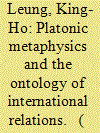

|
|
|
|
|
| Summary/Abstract |
This article offers a reading of Plato in light of the recent debates concerning the unique ‘ontology’ of International Relations (IR) as an academic discipline. In particular, this article suggests that Plato’s metaphysical account of the integral connection between human individual, the domestic state and world order can offer IR an alternative outlook to the ‘political scientific’ schema of ‘levels of analysis’. This article argues that Plato’s metaphysical conception of world order can not only provide IR theory with a way to re-imagine the relation between the human, the state and world order, but also Plato’s outlook can highlight or even call into question the post-metaphysical presuppositions of contemporary IR theory in its ‘borrowed ontology’ from modern social science, which can in turn facilitate IR’s re-interpretation of its own ‘ontology’ as well as its distinct contributions to the understanding of the various aspects of the social world and human life.
|
|
|
|
|
|
|
|
|
|
|
|
|
|
|
|
| 5 |
ID:
077445
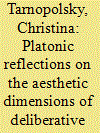

|
|
|
|
|
| Publication |
2007.
|
| Summary/Abstract |
This essay utilizes Plato's insights into the role of shame in dialogical interactions to illuminate the aesthetic dimensions of deliberative democracy. Through a close analysis of the refutation of Polus in Plato's dialogue, the Gorgias, I show how the emotion of shame is central to the unsettling, dynamic, and transformative character of democratic engagement and political judgment identified by recent aesthetic critics of Habermas' model of communicative action and democratic deliberation. Plato's analysis of shame offers a friendly amendment to these aesthetic critiques by showing how the psychological forces at the heart of shame make the outcome of our political engagements with others uncertain and unsettling, even while they make possible the kind of self-reflexivity necessary to foster the deliberative virtue of sincerity or truthfulness
|
|
|
|
|
|
|
|
|
|
|
|
|
|
|
|
| 6 |
ID:
053827
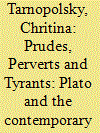

|
|
|
| 7 |
ID:
092139
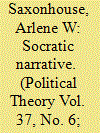

|
|
|
|
|
| Publication |
2009.
|
| Summary/Abstract |
Plato wrote dialogues. While there has been attention to the dramatic elements of Plato's dialogues by a number of scholars, there has been much less attention to the narrative style of the dialogues. I argue that we should consider whether the dialogues are recited or presented like dramatic works with each character speaking his own words-or as a mixture of these narrative forms. By employing this interpretive tool to read the Republic, I illustrate how paying attention to the narrative style enables us to see a democratic Socrates who undermines readings of the Republic famously offered by Karl Popper and Leo Strauss. Plato appears then as neither a defender of the "closed society" nor an advocate of the elite rule of the wise over the many.
|
|
|
|
|
|
|
|
|
|
|
|
|
|
|
|
| 8 |
ID:
119772
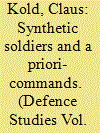

|
|
|
|
|
| Publication |
2013.
|
| Summary/Abstract |
This article outlines two positions in the ongoing discussion in the sociology of the military regarding the horizontal cohesion of battle groups, the vertical esprit de corps and the influence of both on task efficiency. The two concepts are reached through two different ways of observation - an empiricist field study approach and a rationalist survey approach. Field study data generated through direct observations whereas survey data is generated through indirect observation in which general concepts are used. Central is that the use of different methods, also generate different kinds of data. Such a difference is not merely of theoretical interest but also of vital importance to both the political decision process and the military leadership and management process as they rely on correct intelligence before, during and after operations. This article outlines the discussion between the two positions and then goes on to present an attempt to resolve the discussion between the rationalis and the empiricist position in the sociology of the military by using the theories of Agnes Heller. The central concept to theoretically and practically connect a rationalist and an empirist position is the concept of a vivid present - in this context used as a military vivid present.Its heuristic value is demonstrated through two cases from a field study of Danish KFOR (Kosovo Force).
|
|
|
|
|
|
|
|
|
|
|
|
|
|
|
|